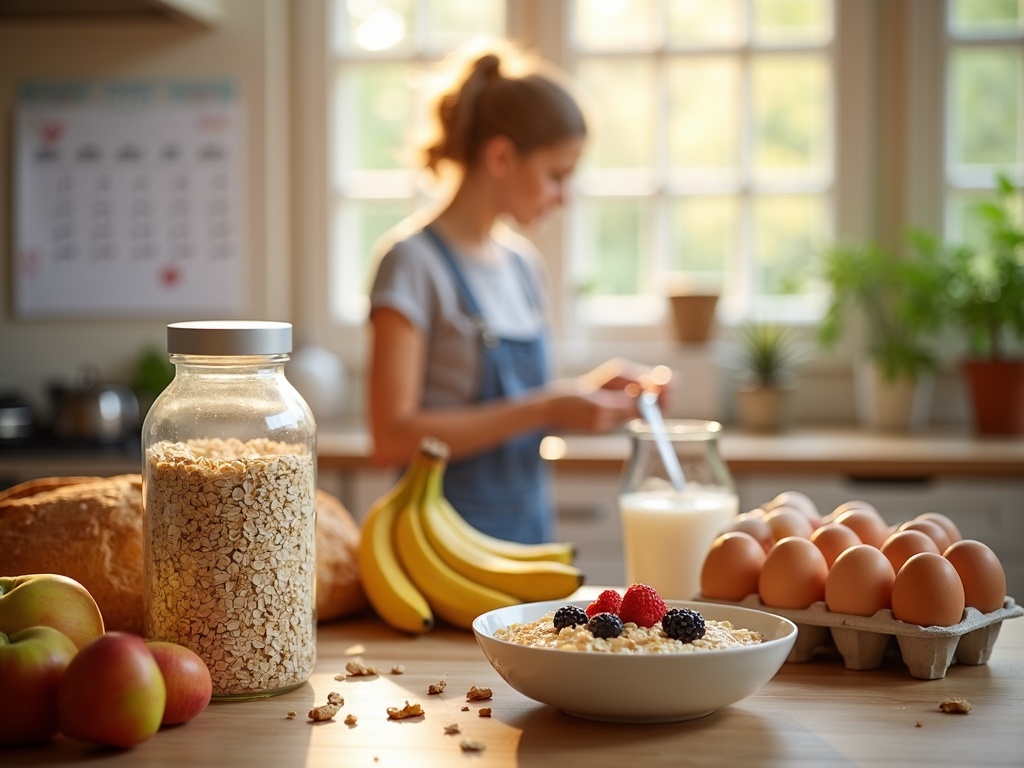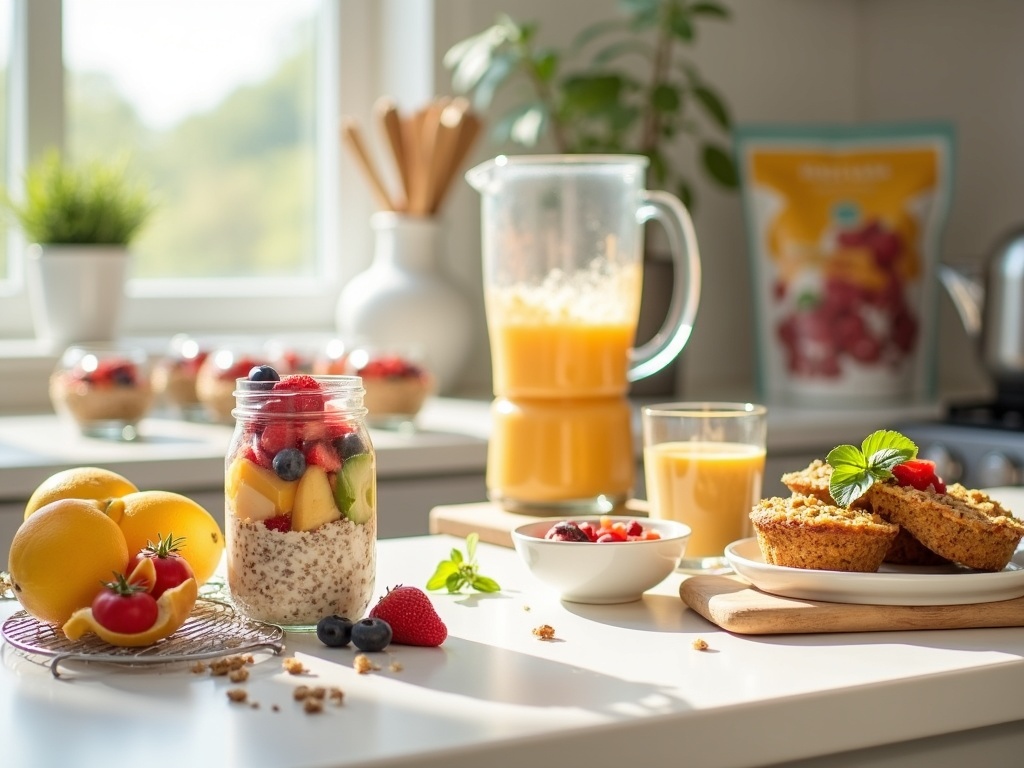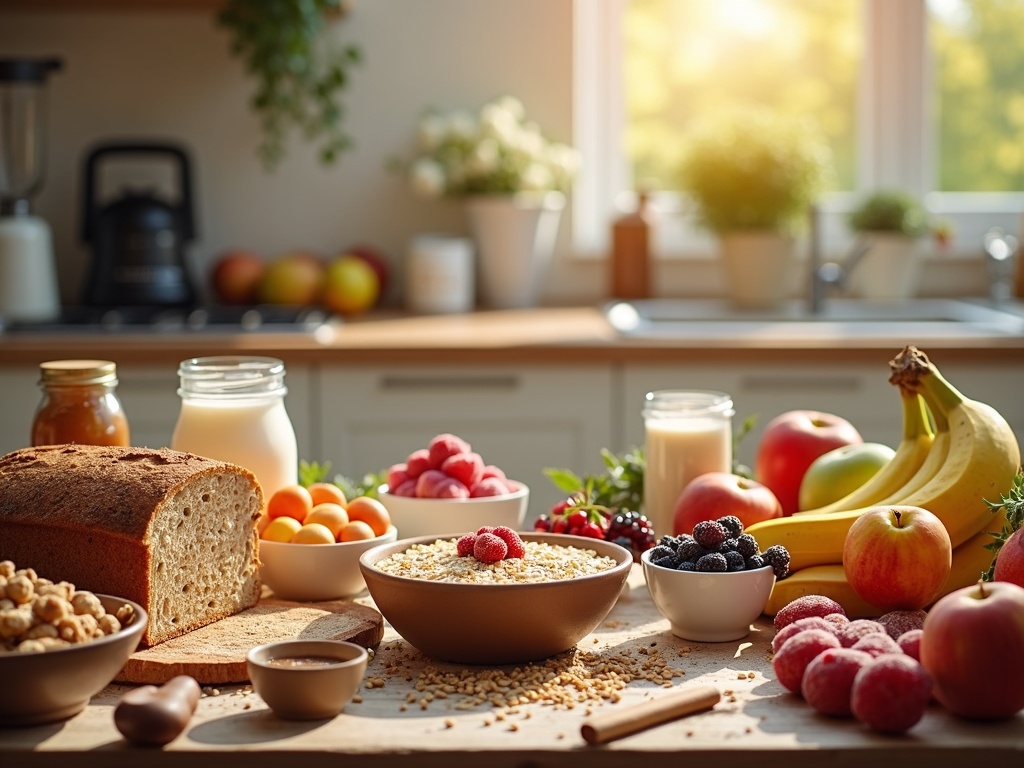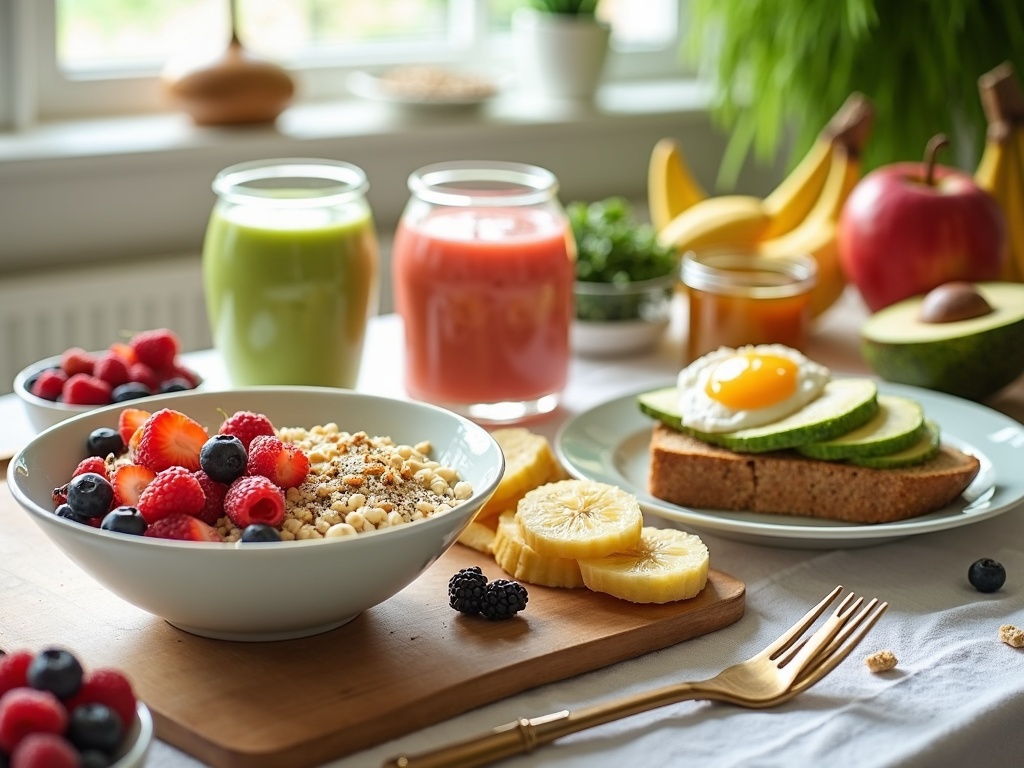I start my day with a Easy Healthy Breakfast that boosts my energy levels and kicks my metabolism up by 20%, according to research from the American Journal of Clinical Nutrition. Greek yogurt with berries, oatmeal, or avocado toast give me the perfect mix of protein, complex carbs, and healthy fats to stay full until lunch while supporting my long-term health goals.
Find In This Article
Key Takeaways
- Protein-packed breakfasts like Greek yogurt (20g per serving) and eggs help control hunger and stabilize blood sugar levels throughout the morning.
- Oatmeal provides soluble fiber that lowers cholesterol, making it an excellent heart-healthy breakfast option that can be prepared in advance.
- A nutritious breakfast doesn’t have to be expensive—homemade oatmeal costs about $0.20 per serving compared to $3-5 for grab-and-go options, potentially saving $1,500 annually.
- Overnight preparation methods like soaking oats or pre-portioning smoothie ingredients can save precious morning time while ensuring healthy choices.
- Maintaining a well-stocked kitchen with versatile ingredients like oats, whole grain breads, yogurt, and fresh fruits makes healthy breakfast preparation significantly easier.
Why These Breakfast Foods Pack a Nutritional Punch
Starting my day with a protein-rich breakfast has completely changed my morning energy levels. It’s not just about feeling full—protein actually boosts your metabolic rate by up to 20%, according to research from the American Journal of Clinical Nutrition. This means I’m burning more calories throughout the day just by making smarter breakfast choices.
Greek yogurt has become my go-to morning protein source. A single serving packs up to 20g of protein, plus it contains beneficial probiotics that support gut health. I love adding fresh berries and a sprinkle of nuts for extra nutrients and texture. This simple combination provides a balanced mix of protein, carbs, and healthy fats that keeps me satisfied until lunch.
Oatmeal deserves its reputation as a healthy breakfast option superstar. The soluble fiber in oats helps lower cholesterol levels, making it particularly valuable for heart-healthy breakfast planning. I’ve found that baked oats can be prepared in advance, saving precious morning time while still delivering solid nutrition.
Avocados might seem like just a trendy food, but their nutritional profile is genuinely impressive. A single avocado provides about 15g of healthy fats and 10g of fiber. I’ve been incorporating them into my morning routine by adding slices to whole grain toast or blending them into smoothies for a creamy texture.
Balancing Your Morning Nutrition
Getting enough fiber in your diet matters tremendously, and breakfast offers the perfect opportunity to work toward daily goals. Dietary guidelines suggest aiming for 25g of fiber daily for women and 38g for men. Many breakfast foods can help you meet these targets:
- Whole grain breads and cereals provide insoluble fiber that supports digestive health
- Fresh fruits add natural sweetness plus both soluble and insoluble fibers
- Chia seeds offer an impressive 10g of fiber per ounce—I add them to yogurt or smoothies
- Savory oatmeal preparations can incorporate vegetables for additional fiber and nutrients
The ideal breakfast combines complex carbohydrates, proteins, and healthy fats. This nutritional trifecta helps stabilize blood sugar levels and provides sustained energy throughout the morning. When I include all three components, I notice significantly fewer mid-morning cravings and better focus during my work.
Experimenting with Bircher muesli has been a game-changer for my breakfast routine. This Swiss breakfast consists of oats soaked overnight in yogurt or milk, then mixed with fruits and nuts. It delivers an ideal nutritional balance while requiring minimal morning preparation.
I’ve found that rotating between these nutrient-dense options prevents breakfast boredom while ensuring I get a variety of vitamins and minerals. The key isn’t perfection with every meal but consistency in choosing foods that deliver genuine nutritional benefits rather than empty calories.
By prioritizing protein, fiber, and healthy fats at breakfast, I’ve transformed this meal from a rushed afterthought into a powerful tool for better health, sustained energy, and improved productivity throughout the day.
Save Money While Eating Better
I’ve discovered that eating a nutritious breakfast doesn’t have to drain my wallet. In fact, making simple switches to homemade options has dramatically cut my food costs while improving my nutrition.
Oatmeal stands out as one of the most budget-friendly healthy breakfast options available. A single serving of homemade oatmeal costs approximately $0.20, compared to $3-5 for those grab-and-go breakfast sandwiches. That’s a savings of around $4 per day, which adds up to nearly $1,500 annually! Plus, oats offer incredible versatility – I can make classic baked oats with fruit, try savory oatmeal topped with an egg, or prepare Bircher muesli overnight for busy mornings.
Fruit provides another affordable nutritional powerhouse for my morning routine. Bananas cost around $0.58 per pound, making them one of the most economical fruits available. A medium banana delivers potassium, fiber, and natural sweetness for about $0.25 – far cheaper than a processed breakfast bar.
Weekly Budget Breakdown
With just $20 per week, I can purchase all the essentials for a week’s worth of heart-healthy breakfasts:
- Large container of oats ($3-4): Provides 2-3 weeks of daily servings
- Dozen eggs ($3-5): Offers protein-packed options for the entire week
- Loaf of whole grain bread ($3-4): Perfect for toast or sandwiches
- 3-4 pieces of seasonal fruit ($5-6): Bananas, apples, or berries depending on sales
- Milk or yogurt ($3-4): For added protein and calcium
This approach delivers significantly better value than buying breakfast out. My calculations show that making breakfast at home saves me between $15-25 per week compared to purchasing similar meals at cafes or fast-food restaurants. That’s $780-1,300 in annual savings!
The financial benefits extend beyond immediate cost savings. Meal prepping has drastically reduced my food waste – I’m no longer throwing away forgotten produce or half-eaten containers. I prepare breakfast foods like overnight oats in batches and portion out fruit at the beginning of the week. This strategy not only saves time each morning but also ensures I use everything I purchase.
I’ve found that cooking at home gives me complete control over ingredients while keeping costs low. Store-bought granola might cost $6-8 per bag, but homemade costs less than half that amount. The same principle applies to smoothies, which cost $7-9 at juice shops but only $1-2 when made at home.
By prioritizing simple, whole foods and preparing them myself, I’ve created a sustainable breakfast routine that supports both my health goals and financial objectives. The modest upfront investment in basic ingredients delivers substantial savings that build over time, proving that eating well doesn’t require spending more.

Quick and Easy Prep Methods That Work
I’ve found that breakfast preparation doesn’t need to be complicated to be healthy. With just a few strategic techniques, I can prepare nutritious morning meals in minutes rather than hours.
Overnight Success with Minimal Effort
Overnight oats have become my go-to solution for busy mornings, taking less than 10 minutes to prepare the night before. The basic recipe couldn’t be simpler: combine rolled oats, almond milk, chia seeds, and your choice of fruits in a jar, refrigerate overnight, and enjoy a nutritious breakfast option the next morning. What I love most is how customizable they are – adding cinnamon, honey, or nuts transforms the flavor profile completely.
For variety beyond basic overnight oats, I often prepare Bircher muesli using a similar method, soaking oats with grated apple and yogurt for a delicious Swiss-inspired breakfast.
Smoothies offer another lightning-fast option, ready in under 5 minutes when using pre-frozen ingredients. I keep freezer bags filled with portioned fruit combinations, so I simply need to dump the contents into a blender, add liquid, and blend for an instant heart-healthy breakfast on the go.
Strategic Meal Planning for Success
Studies show that meal preppers are 62% more likely to eat a healthy breakfast daily. This statistic transformed my approach to morning meals. Now I dedicate an hour on Sundays to prep ingredients for the week ahead:
- Chopping fruits and storing in containers
- Pre-portioning smoothie ingredients in freezer bags
- Mixing dry baked oats ingredients to quickly combine with wet ingredients later
- Preparing egg muffins that can be reheated quickly
For those mornings when I crave something warm and savory, I prepare savory oatmeal toppings like roasted vegetables or sautéed greens in advance. This allows me to quickly reheat them while basic oats cook.
I’ve found that keeping a variety of breakfast foods prepped helps prevent morning decision fatigue. When I’m rushing out the door, I can grab something healthy without thinking too hard about it. Simple preparation methods have made healthy breakfast choices automatic rather than aspirational in my daily routine.

Power-Packed Breakfast Combinations
Starting my day with nutrient-dense breakfast combinations helps me maintain energy levels throughout the morning. I’ve found that mixing different food groups not only keeps breakfast interesting but also delivers a complete nutritional profile.
Protein-Rich Smoothies
Smoothies are my go-to morning option when I need something quick yet nutritious. A well-crafted smoothie provides 3-5 servings of fruits and vegetables in a single glass. I’ve learned to balance my smoothie ingredients for optimal nutrition:
- 1 cup frozen berries (antioxidants and fiber)
- 1 banana (potassium and natural sweetness)
- Handful of spinach (vitamins A and K)
- 1 tablespoon nut butter (healthy fats and protein)
- ½ cup Greek yogurt (extra protein)
The key is getting 20-25g of protein at breakfast, which helps control hunger and stabilizes blood sugar. I achieve this by adding cottage cheese, Greek yogurt, or plant-based protein powder to my smoothies. These healthy breakfast options keep me full for hours.
Using both fresh and frozen produce gives me flexibility – frozen fruits provide thickness and cooling without diluting flavor with ice, while fresh ingredients offer peak nutrition when in season.
Wholesome Toast Variations
Avocado toast has become my reliable breakfast staple. The healthy fats from avocados offer sustained energy and brain-boosting benefits. I often enhance my toast with:
A perfectly poached egg adds approximately 6g of complete protein and makes my heart-healthy breakfast more satisfying. For variety, I sometimes swap bread for sweet potato slices or use hummus instead of avocado.
For a sweet alternative, I spread nut butter on whole grain toast and top with sliced bananas and a sprinkle of cinnamon. This combination delivers protein, complex carbs, and potassium.
Breakfast foods like baked oats offer another versatile option. I prepare them with milk, eggs, and fruit for a cake-like texture that’s both nutritious and delicious.
For savory mornings, savory oatmeal topped with a soft-boiled egg, avocado, and cherry tomatoes satisfies my craving for something hearty. On days when I need breakfast prepared ahead, Bircher muesli soaked overnight with grated apple, yogurt, and nuts gives me a ready-to-eat morning meal packed with fiber and nutrients.
By combining proteins, healthy fats, and complex carbohydrates, I’ve created breakfast routines that fuel my body efficiently and taste delicious – proving that healthy doesn’t have to be boring or complicated.
Must-Have Ingredients for Your Shopping List
I’ve found that stocking my kitchen with the right ingredients is half the battle when it comes to preparing nutritious morning meals consistently. A well-planned shopping list ensures I always have healthy options available, even on busy mornings.
Foundation Ingredients
Oats deserve the top spot on any healthy breakfast foods shopping list. This versatile grain provides complex carbohydrates that release energy slowly throughout the morning, keeping hunger at bay. I can use them for traditional oatmeal, warm baked oatmeal, overnight oats, or even savory breakfast bowls. Steel-cut oats offer a chewy texture, while rolled oats cook faster for busy mornings.
Whole grain breads are another essential. Unlike their refined counterparts, whole grain options retain the fiber and nutrients from the grain. I look for breads with “whole grain” as the first ingredient and at least 3 grams of fiber per slice.
For protein, Greek yogurt is a powerhouse ingredient. With roughly twice the protein of regular yogurt and less sugar, it keeps me full longer and supports muscle repair. I can enjoy it plain with toppings or use it as a base for creamy breakfast muesli.
Eggs are perhaps the most versatile protein source for mornings. Beyond the classic scramble, I can hard-boil them ahead of time for grab-and-go breakfasts or add them to whole grain toast for a balanced meal. Research shows eggs can be part of a heart-healthy breakfast when consumed in moderation.
Nutritious Add-ins and Toppings
Fresh and frozen fruits add natural sweetness and essential nutrients to breakfast. I make sure to grab:
- Berries (high in antioxidants and lower in sugar)
- Bananas (perfect for smoothies and oatmeal)
- Apples (for slicing onto toast or dipping in nut butter)
- Frozen fruit mixes (convenient for smoothies without spoilage concerns)
Nut butters provide healthy fats that help me feel satisfied. Almond butter offers more vitamin E than peanut butter, while natural peanut butter tends to be more budget-friendly. I always check labels to avoid added sugars and oils.
For smoothies and quick morning blends, I keep both fresh and frozen produce on hand. Spinach and kale can be frozen in portions and added directly to the blender without affecting taste significantly. Fresh avocados add creaminess and healthy fats.
Seeds and nuts deserve a spot in my pantry too. Chia seeds swell when added to liquid, creating a pudding-like texture while adding omega-3 fatty acids. Flaxseeds need to be ground to release their nutrients. Both can be sprinkled onto yogurt or oatmeal. Walnuts, almonds, and pecans add crunch and nutritional value.
Dairy or plant-based milk rounds out my shopping list. Whether I prefer traditional dairy milk for its natural protein or plant alternatives like almond or oat milk, having a carton ready means I’m never without a base for smoothies, oatmeal, or cereal.
Honey, maple syrup, or date syrup serve as natural sweeteners when needed. They add complexity beyond just sweetness, though I use them sparingly.
Keeping these ingredients on hand has transformed my morning routine. Instead of reaching for processed options, I can quickly assemble a balanced breakfast that keeps me energized and focused until lunch. The best part? Most of these items have a long shelf life or can be frozen, meaning fewer grocery trips and less food waste.

Sources:
American Heart Association, “The Role of Fiber in Heart Health”
Cleveland Clinic, “Benefits of Greek Yogurt”
USDA National Nutrient Database, “Oatmeal and Eating on a Budget”
Journal of Nutrition Education and Behavior, “Meal Prep and Healthy Eating”
Dietary Guidelines for Americans, “Fiber Recommendations”
Institute of Culinary Education, “Quick Breakfast Ideas and Techniques”

